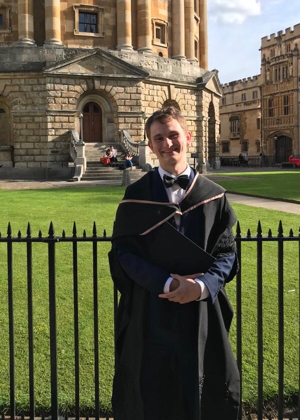Alumni Callum Coghlan graduated this year with a 1st Class Engineering Science MEng. During his time at Oxford he developed a keen interest in energy and sustainability, which led to an MSc in Environmental Technology at Imperial College London and subsequently to the European arm of US Management Consultancy company Guidehouse.
In his role as an energy transition consultant, Callum plans to help drive the energy transition as swiftly, efficiently, and equitably as possible. He told us how his time at Engineering Science developed his interest in and aptitude for this line of work.
Tell us about your time at Oxford
Oxford was an absolute ball from start to finish! Four very varied and exciting years, challenging but rewarding studies, endless opportunities, lifelong friends.
What inspired you to take up Engineering?
I grew up near Paddington Station during the noughties when rail extensions were popping up all over London. The tube, the Overground, the DLR, all these exciting new projects. I loved trains as a child, and this evolved over time into being interested in how the systems and infrastructure underpinning it came to be. Naturally, this led me towards engineering. I applied for civil engineering everywhere except Oxford, where the course is more general.
How did you get into your current job?
I was very lucky that engineering at Oxford is so general. During my gap year job at a building services consultancy, I became interested in sustainability. A second year summer internship taught me that civil engineering was not for me, and after dabbling in biomedical engineering for a year, switched my focus firmly to sustainable energy. A Master’s in Environmental Technology at Imperial followed, which led me to my current role as an energy transition consultant at Guidehouse, helping companies from across the energy value chain to navigate the complexities of the move to low-carbon energy.
What is an average day like for you?
I typically work 9-6, with one or two projects on the go with different clients. I like to be busy, and living in London makes it very easy to organise something with colleagues or friends most evenings. When the weather is decent, I cycle to and from the office (though I have the flexibility to work from home, too).
How has your degree helped you?
 An Oxford engineering degree forces you to strategise. The general nature of the course honed my ability to juggle multiple complicated topics at once, the tutorial system taught me not only how to solve problems but solve them accessibly, and the intensity of Oxford terms (both work and pay) made me very efficient at managing my commitments to be able to have the most fulfilling time. All three elements have helped make the transition to working life smoother, and ensure that I can make a meaningful contribution towards delivering the energy transition as quickly as possible.
An Oxford engineering degree forces you to strategise. The general nature of the course honed my ability to juggle multiple complicated topics at once, the tutorial system taught me not only how to solve problems but solve them accessibly, and the intensity of Oxford terms (both work and pay) made me very efficient at managing my commitments to be able to have the most fulfilling time. All three elements have helped make the transition to working life smoother, and ensure that I can make a meaningful contribution towards delivering the energy transition as quickly as possible.
What excites you about engineering?
Working on solutions to climate change means I am always being exposed to new technologies. Whilst some are certainly less effective than others, the shear breadth of ideas being turned into prototypes or products is amazing – engineering takes an idea and tries to turn it into reality. Given the myriad problems we face at the moment, the implementation element of engineering is brilliant.
What are your visions for the future, and what are the next steps?
I would like to see a low-carbon society as soon as possible, which is founded on kindness and collaboration (key in engineering!). It is worth acknowledging, though, that some of the solutions to climate change involve becoming less reliant on technological silver bullets.
Sometimes the simplest ideas are best.
Digital Underground Construction
Geotechnical Engineering

